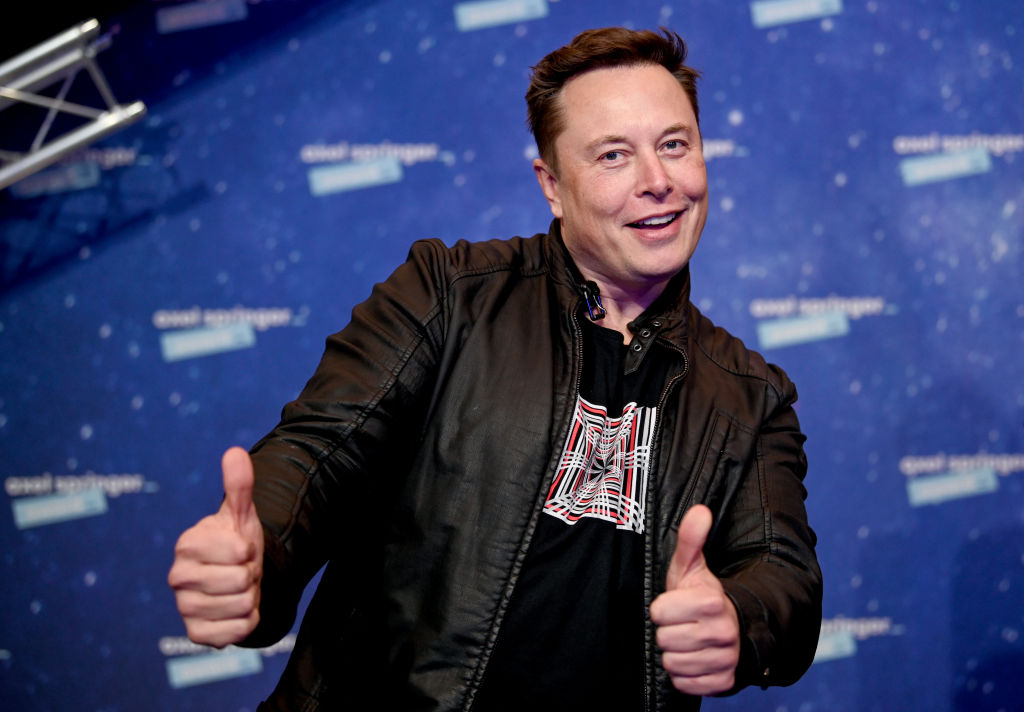Elon Musk Is the New ‘Technoking of Tesla’
The chief executive will retain his role while changing his title at the electric-vehicle maker
Tesla Inc. said Chief Executive Elon Musk has changed his title at the company to “Technoking of Tesla,” extending an irreverent streak in the 49-year-old’s leadership of the electric-vehicle maker.
The company also said Chief Financial Officer Zach Kirkhorn will have the title of “Master of Coin.” Both Mr Musk and Mr Kirkhorn will maintain their respective positions as CEO and financial chief, according to a regulatory filing with the Securities and Exchange Commission on Monday.
The company didn’t explain the meaning of the titles and didn’t respond to an inquiry. Mr Kirkhorn’s new title might carry echoes of Tesla’s ambitions around cryptocurrency. Earlier this year, Tesla said that it had invested $1.5 billion in bitcoin and that it aims to start accepting bitcoin as payment from car buyers.
Over the weekend, bitcoin crossed $60,000 for the first time Saturday before falling back. A steady stream of institutional demand has been credited with driving much of bitcoin’s rally since the start of 2020, when it traded near $7,000.
Other companies have also embraced bitcoin in recent months. Square Inc., which shares bitcoin advocate Jack Dorsey as its CEO with Twitter Inc., acquired about $50 million worth for its corporate treasury in October. Bank of New York Mellon Corp. said it would start treating bitcoin like any other financial asset, and Mastercard Inc. said it would integrate bitcoin into its payments network this year.
Most job titles for corporate leaders conform to a narrow set of variations, but some Silicon Valley companies have previously used fanciful language to describe workers’ roles. For years, some companies have used terms such as “guru,” “jedi” or “ninja” to colour job descriptions that involve expertise or mental agility. Other colourful titles to emerge include chief happiness officer, chief futurist and chief digital evangelist.
Tesla disclosed the title changes amid signs of a bumpier road ahead than in 2020. Rivals are showing early signs of eating into its market-share lead in electric-vehicle sales. The company briefly shut down some of its car production at its lone U.S. plant last month due to parts shortages. Tesla also has said it expects lower Model S sedan and Model X sport-utility vehicle output this quarter as it introduces updated versions of the vehicles, though it is increasing output of its Model Y compact sport-utility vehicle in China.
Shares in Tesla soared more than 700% last year, then fell more than 25% earlier this month and are little changed for the year. The company last year achieved record car deliveries, posted its first full-year of profit and landed a spot on the S&P 500 index.
Mr Musk’s new title could be intended to reflect Tesla’s view that it is the source of technology disruption over the long term, Wedbush analyst Daniel Ives wrote in a research memo, pointing to the company’s autonomous-driving work and its strides in battery technology.
Mr Musk’s role as Tesla’s public face hasn’t kept him from pulling cheeky provocations. Breaking away from the mould of big-company CEOs who make carefully worded public statements, Mr Musk often posts Twitter messages with freewheeling thoughts about subjects ranging from Tesla’s share price to science-fiction topics and online memes.
Tweeting has gotten Mr Musk in trouble with regulators. In 2018 he announced on Twitter that he was considering plans to take the auto maker private, a claim later deemed misleading by the SEC after it became clear he didn’t have funding finalized for such a move.
He denied wrongdoing but eventually settled with a deal that included him giving up his position as chairman of Tesla and agreeing to have any of his Twitter messages relating to the auto maker’s business reviewed before publishing them.
Mr Musk’s ownership stake in the company helped him surpass Amazon.com Inc. founder Jeff Bezos as the world’s richest man this year.
Also, Tesla on Monday named Jerome Guillen, who has run the company’s automotive business, as its president of Heavy Trucking. He oversaw the truck project in a previous role and, before joining Tesla in 2010, worked on trucks at Daimler AG.
The appointment comes as the car maker ramps up activity around its delayed semitrailer truck.
Tesla over the weekend tweeted a video of the electric cab driving on a test track. Mr Musk has said the supply of sufficient batteries has been holding back the truck. “If we were to make the Semi like right now, which we could easily go into production with the Semi, but we would not have enough cells for it right now,” Mr Musk said on the company’s latest earnings call in January.
 Copyright 2020, Dow Jones & Company, Inc. All Rights Reserved Worldwide. LEARN MORE
Copyright 2020, Dow Jones & Company, Inc. All Rights Reserved Worldwide. LEARN MORE
This stylish family home combines a classic palette and finishes with a flexible floorplan
Just 55 minutes from Sydney, make this your creative getaway located in the majestic Hawkesbury region.
Continued stagflation and cost of living pressures are causing couples to think twice about starting a family, new data has revealed, with long term impacts expected
Australia is in the midst of a ‘baby recession’ with preliminary estimates showing the number of births in 2023 fell by more than four percent to the lowest level since 2006, according to KPMG. The consultancy firm says this reflects the impact of cost-of-living pressures on the feasibility of younger Australians starting a family.
KPMG estimates that 289,100 babies were born in 2023. This compares to 300,684 babies in 2022 and 309,996 in 2021, according to the Australian Bureau of Statistics (ABS). KPMG urban economist Terry Rawnsley said weak economic growth often leads to a reduced number of births. In 2023, ABS data shows gross domestic product (GDP) fell to 1.5 percent. Despite the population growing by 2.5 percent in 2023, GDP on a per capita basis went into negative territory, down one percent over the 12 months.
“Birth rates provide insight into long-term population growth as well as the current confidence of Australian families,” said Mr Rawnsley. “We haven’t seen such a sharp drop in births in Australia since the period of economic stagflation in the 1970s, which coincided with the initial widespread adoption of the contraceptive pill.”
Mr Rawnsley said many Australian couples delayed starting a family while the pandemic played out in 2020. The number of births fell from 305,832 in 2019 to 294,369 in 2020. Then in 2021, strong employment and vast amounts of stimulus money, along with high household savings due to lockdowns, gave couples better financial means to have a baby. This led to a rebound in births.
However, the re-opening of the global economy in 2022 led to soaring inflation. By the start of 2023, the Australian consumer price index (CPI) had risen to its highest level since 1990 at 7.8 percent per annum. By that stage, the Reserve Bank had already commenced an aggressive rate-hiking strategy to fight inflation and had raised the cash rate every month between May and December 2022.
Five more rate hikes during 2023 put further pressure on couples with mortgages and put the brakes on family formation. “This combination of the pandemic and rapid economic changes explains the spike and subsequent sharp decline in birth rates we have observed over the past four years,” Mr Rawnsley said.
The impact of high costs of living on couples’ decision to have a baby is highlighted in births data for the capital cities. KPMG estimates there were 60,860 births in Sydney in 2023, down 8.6 percent from 2019. There were 56,270 births in Melbourne, down 7.3 percent. In Perth, there were 25,020 births, down 6 percent, while in Brisbane there were 30,250 births, down 4.3 percent. Canberra was the only capital city where there was no fall in the number of births in 2023 compared to 2019.
“CPI growth in Canberra has been slightly subdued compared to that in other major cities, and the economic outlook has remained strong,” Mr Rawnsley said. “This means families have not been hurting as much as those in other capital cities, and in turn, we’ve seen a stabilisation of births in the ACT.”
This stylish family home combines a classic palette and finishes with a flexible floorplan
Just 55 minutes from Sydney, make this your creative getaway located in the majestic Hawkesbury region.






















